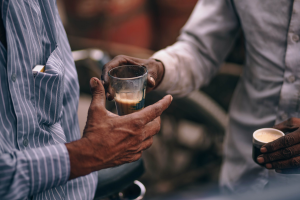
I don’t accept
The notion of coincidence
Yet I’m told to write
This elevator speech
About how we will
Lift you up
And help you find
Your audience.

Poetry is Good for America

I don’t accept
The notion of coincidence
Yet I’m told to write
This elevator speech
About how we will
Lift you up
And help you find
Your audience.

Women gathered.
Knowledge. Nappies.
They learned
Their places
Beside bedsides,
Machines, and graves.
Women’s wealth
Wasn’t worth
Ticking cloth.
They backed
Husbands and fathers.
In the war.
Some men returned
Bandaged or broken,
Whole, or not at all.
But when men
Come home, the
Women have to.
Riveting biceps
Industrial muscles
To lift laundry,
Bolted to stoves
As sure as sheet
Metal to planes.
The same nylons,
Sewn to save lives
Men parachute
Alive, lifted aloft
Gartered the girls
On the ground.
Before the men
Came home,
The women ran,
Barren or barefoot,
Lithe or lame,
But hunter-free.

These are the nights that I love the best
When we set a place at the table for an unexpected guest.
For we have love and light and food enough to share,
And if you bring an extra friend, we’ll just pull up another chair.
Come and walk in the dream awhile with me–
Come, be my home, be my chosen family.
Now the fire beckons, and its glow will start to bring
The memories of an old song and a new one yet to sing.
And we’ll tell an old war story we all know the ending to,
And if you have to leave, we know you’ll take a piece of us with you.
Come and walk in the dream awhile with me–
Come, be my home, be my chosen family.
My family is my home where I can safely rest,
It’s chosen in love, and by this love is blessed.
And even in a foreign land or campaign ‘cross the sea,
These are the ones I love, this is my chosen family.
Come and walk in the dream awhile with me–
Come, be my home, be my chosen family.

May 5 will mark the 14th observation of Alive Day in our home. It’s a strange thing, Alive Day. It’s not a day of despair for us, despite the solemnity of the event and the loss of two of his soldiers. My husband is thankful for every moment he is present, but it is not a day of celebration, either. I, as the person who cares for and shares this journey with Terry, am left with no ‘right’ words or ways to observe this anniversary.
Through the years, our focus has been, to try to be living memorials, if you will, to the men we lost that night. To be mindful of the second chance we have been given, and to not squander it, while still honoring their sacrifice. R.I.P. PFC Bradley Kritzer and Spc. James Marshall, you and your families, are in our hearts and minds every day.
“Sorrow may last for a night but joy comes in the morning…”
Allegory
What if, when Sorrow felt
The Carrier fell and anxiously knelt
At the grave of hope’s dusty tomb
Outlined in the bleak light of moon
With her head bowed she heaved a sigh
And rent the air with her cry
While in the poltroonish cover of night
That Sorrow did clash with hallowed light
And Carrier crumpled and aggrieved
Could not battle her joy’s thief
But as the sun did split the sky
The light victorious gained its prize
And Sorrow conquered was forced to flee
So Carrier could arise free.

There will always be a civil-military divide, or gap, or chasm–if we are always standing on one side of a bridge. We–military, veterans, servicemembers–are HERE. You–everyone else–are THERE.
Then we ask the question, “But how do we bridge the gap?”
The answer to that question is whatever particular hammer we happen to be carrying at the moment.
But what if we–the ones who served–started to think of ourselves as a neighborhood. Or a family. Or a gathering. Or a home.
Here in the center of our family are those who give it definition–the human being in uniform, no matter what job they do, or how long they served. At least once in their lives, they signed on the dotted line and stepped up to the service of their country.
Standing around them, though, who are they? The support system. First, we find those who have deployed with us, even if they did not wear a uniform. Here’s the person working the food line at the chow hall in Kuwait. Here’s the contractor working on an innovation in robotics to save lives. Or the civilian medical professional taking care of servicemembers for everything from a routine appointment to emergency medicine.
The edges of our community grow blurrier as the neighborhood continues. Here are our families–spouses, parents, siblings, children. They often wear our service as a badge, or with pride, because careers, even four-year enlistments, are “needs of the Army,” not “needs of our loved ones.” And they get it.
Keep traveling, all roads connect us. Here’s the difficult part of town. Here is the block of those whose service–or whose loved one’s service–has burned them. The divorcee, the underemployed spouse, the failure to adapt. The ex-servicemember who suffered from assault or abuse. These lives have been touched by, and have touched, uniformed service. They’re part of the community, even if we don’t drive by that part of town very often.
Just stopping by for a visit, these are the friends whose only touchpoint with the military might be that person from back home they knew in high school, and connected with later on social media, who give a “like” to pictures of their old friend in uniform, but don’t really get the jokes in the DuffelBlog articles they share. Maybe it’s the people who “support the troops,” but haven’t taken the time to really drive around town and get to know everyone.
To stretch this metaphor to the point of killing the elastic, there is one more point. When we think of ourselves as a neighborhood, or a community, it becomes easier to envision traveling outside that community. Maybe that is literal travel, perhaps it’s the ability to share stories about life in the neighborhood. In any case, we are no longer faced with a deep chasm, gaping between our side of the road and “their” side of the road.
Instead, we are much larger than we think, and those we include can help us connect–and stay connected–to the other communities we touch.